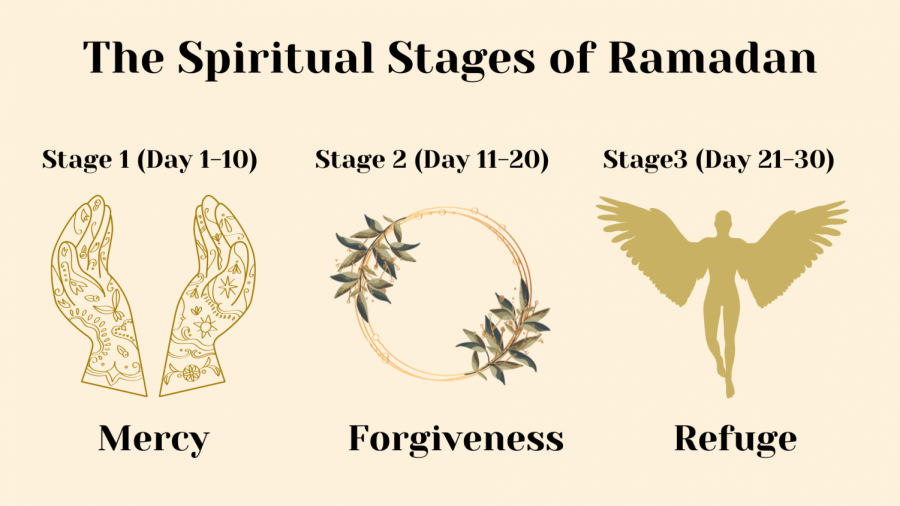The Phases of Fasting
Read about the physical and spiritual phases of Ramadan.
May 18, 2021
To many, Ramadan can feel very overwhelming or difficult. But worry not! As draining as fasting can be at the beginning of the month, studies show that fasting naturally gets easier as the month goes on- and there are plenty of health benefits.
Let’s break it down into four phases.
PHASE 1
The first few days of fasting are usually the hardest- one might experience headaches, dehydration, nausea, dizziness, or extreme hunger. During this first phase, your body is just beginning the cleansing process. Your blood sugar and blood pressure will most likely also drop.
PHASE 2
The transition into Phase 2 occurs after the first full week of fasting. During this phase, the body, especially the digestive system, is slowly starting to get more accustomed to fasting. More specifically, the digestive system can focus on cleansing the body. The organs also begin a cleansing process.
PHASE 3
The third phase of fasting occurs about halfway through Ramadan. By this time, you should have a lot more energy and be able to concentrate on your daily tasks better. Fasting will probably be a lot easier as well. Overall, your body’s healing process is a lot faster and your skin, body, and organs are all experiencing a detox.
PHASE 4
The last phase of fasting is during the last 10 days of Ramadan. Your body and mind are both fully accustomed to fasting- you should be able to function normally as you would if you were not fasting. Patience and concentration will have increased.
These are the physical phases of fasting. But as I’ve mentioned before, fasting during Ramadan is not only about just not eating/drinking – it’s also about practicing patience, kindness, restraint, etc. Take a look at the infographic below to get an idea of what the three spiritual stages, or ashra, look like.
MY EXPERIENCES
Overall, my experience with fasting followed the four physical stages of Ramadan. While the cycle did start over for me because of menstruation and days where I didn’t feel well, I generally became accustomed to fasting within a week or so. As a junior taking multiple AP classes and starting to prepare for college, I also genuinely appreciated the extra time I got from not having to sit down for meals. Personally, I didn’t mind fasting while also going to school- there was an extra sense of clarity and concentration that this Ramadan provided. However, there were some bad days where I was extremely tired, dehydrated, and lethargic.
Here are some tips I picked up along the way to help me stay hydrated and active while fasting:
-During Suhoor, drink a lot of water and eat hydrating foods like cucumbers and watermelon
-Eat foods like these during Iftar as well
-Take cold showers!
-Wash your face to refresh yourself
-If and when going out in the sun, wear a hat and/or lighter colors
Do try to go outside once a day, even if it’s just for 15 minutes
-If you’re going to take a nap, make sure it’s only for about 90 minutes
I find that longer naps, combined with no water and food for the day can actually make me feel worse, as well as more lethargic
Watching TV or staring at a screen for a prolonged period of time also makes me feel this way
-Use your time productively: don’t spend time trying to calculate how many more hours until Iftar, instead spend that time doing something creative or helpful for someone else
-GO TO SLEEP EARLY!!
The worst feeling is getting only a few hours of sleep before Suhoor and then having to get through the entire school day the next morning
And last but not least:
-Take a break when needed.
Everybody’s body is different, everyone has a different experience with Ramadan and fasting and Islam. It’s okay if you’re not feeling well one day and you decide you can’t fast. It’s okay to not feel ‘connected’ spiritually with Islam all the time. It’s okay to just do you and take your time with this process.

